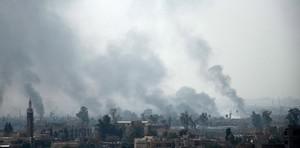Battle for MosulThe tragedy of Mosul: battle against Islamic State is leading to all-too-familiar consequences
A tragedy is unfolding in Mosul, the northern Iraqi city that Islamic State (IS) has brutally occupied since June 2014. The spike in civilian deaths – the result of an intensification of bombing by the international coalition during February and March — has been so dramatic, it has prompted speculation that the U.S. military has changed its rules of engagement. It has also sparked debate about whether deaths caused by the West are held to a different standard than those caused by countries like Russia. The impacts of Mosul’s brutal occupation and painful liberation are compounding Iraq’s seemingly endless list of social and economic problems. The tragedy of Mosul is that while IS’s territorial project in Iraq is coming to an end, it is creating new problems – destruction, displacement, trauma – that exacerbate the country’s existing challenges. The West must acknowledge its role in stoking this crisis, just as Russia and Iran have been responsible for suffering in Syria. Mosul, it seems, is the West’s Aleppo.

The battle for Mosul remains a difficult task // Source: theconversation.com
A tragedy is unfolding in Mosul, the northern Iraqi city that Islamic State (IS) has brutally occupied since June 2014.
Airstrikes conducted by the international coalition have killed more than 300 civilians in the course of a few weeks. And an investigation is under way to determine who is to blame for more than 200 deaths in Mosul’s al-Jadida neighbourhood on 17 March. This is the most deadly event in the battle for Mosul so far.
Given the carnage this one attack caused, it is perhaps unsurprising that local sources put the kill count much higher. Bassma Bassim, head of the Mosul District Council, claimed airstrikes killed “more than 500” civilians in one week in March alone.
All too familiar
The spike in civilian deaths during February and March has been so dramatic it has prompted speculation that the U.S. military has changed its rules of engagement. It has also sparked debate about whether deaths caused by the West are held to a different standard than those caused by countries like Russia.
Long-time Middle East journalist Patrick Cockburn argues the West vehemently denounced Russia and Syria for alleged war crimes for indiscriminate bombing of densely populated areas during the siege of Aleppo, while hypocritically engaging in similar activities in Mosul at the same time.
The result has been the same. Scores of civilians have been killed in their homes or crushed beneath the rubble of supposed bomb shelters. This has led Amnesty to suggest the coalition is violating international humanitarian law in its campaign in Mosul.
It is not the first time Western airstrikes have killed Iraqis at the same time as Western politicians have claimed to be saving Iraq. But the deaths in Mosul on 17 March – a day after the anniversary of the 1988 Halabja chemical weapons massacre – will add another tragic anniversary to Iraq’s already overloaded memorial calendar.
Mosul’s residents are caught between the brutal violence of IS, which hides among civilians and uses them as human shields, and the amassed firepower of the Iraqi armed forces and their international backers. As one Mosul resident put it: “We are like the wheat between the millstones. They are killing us.”
